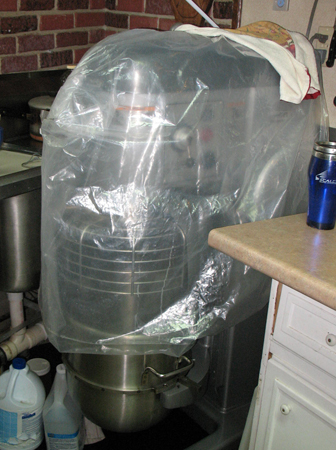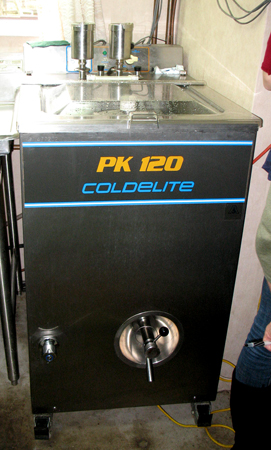Our last workshop of the season was held Saturday, October 3rd at Pete Demchur's Shellbark Hollow Farmin East Goshen Township, where he raises Nubian goats and makes excellent cheeses. Managed with the help of his sister Donna Demchur Livitsky, who was involved with the Harvest Festival at Stargazer's Vineyard, their friend Maureen was helping Pete coordinate the day.
Pete has worked the farm for about 15 years, on just 3.6 acres, with another 2 acres across the street and a separate 1.5 plot and barn in the same block. With a total of 50 goats, 30 of them milkers, he doesn't need much land. He averages about 1 gallon of milk daily from each, yet suggests that most larger farms get 2-3 quarts from their goats. It's obvious that Pete's goats adore him. They're all happy, very vocal and as friendly as your pet Lab.
Pete began the workshop with a little history about how he began cheesemaking. He spent five years perfecting his recipes before he sold one ounce. Rather than copy what other cheesemakers produced, Pete developed the signature tangy taste of his Sharp 2, his wonderful spreads and his creamy chevres for his own palate. Most of the time he doesn't even add salt. He depends on the quality of his milk to give him one of the best award winning products this side of the Atlantic. Even the French producers have commended him on his talents as a cheesemaker. Latest is a Tomme that he's perfecting.
Because goat's milk has a smaller molecular structure than cow's milk, it is more easily digestible and more like human milk. The genetics of breed and quality of feed are important too. Pete mixes a custom grain, made up of flax and western alfalfa. His babies and bucks get local hay because they don't need much protein when young. The milkers get the special mix, up to 2 lbs per day. His milkers get as much food as they want; he keeps them fat and again- happy. Because goats are susceptible to the same diseases as cows, cleanliness is paramount.
He tries to breed early in the year during September, so a buck is put in with the 'girls' in June, in an effort to get babies before the fall. Separating them at birth reduces stress and disease on both the mother and baby, making future animal management easier as well. Pete has a monitor set up in the birthing room so that he can be ready when they are. His 3-4 mature bucks barely eat during rutting season and the dominant animal breeds the most. At between 3 and 5 days old, most bucks are sold at auction as either pets or for meat. Longevity for males is 7 years, for females it's a little longer at 9 to 10 years.
Amazingly, goats will eat very brushy plants like poison ivy, thistle and multiflora. Azalea, rhododendron and hemlock are all poisonous to goats so be careful about which fields you put them in to graze. Pete suggests that if they have enough good food they won't go for the bad stuff. Goats have been used in the city of Los Angeles instead of landscape crews for cleaning steep hillsides. They're more environmentally sound than gas weed whackers, and they cost the city less! Read about it here.
Back to the cheese. Pete showed us how to pasteurize. Heat milk to 160 degrees, cool to 80 or 90 degrees, then add bacteria or your live culture. If you're doing a raw milk cheese, only heat to 80-90 degrees. For a sharp cheese, add enzymes before you add the rennet. There are different enzymes for different kinds of cheeses. Pete documents each batch to have a record of what went wrong, when anything rarely does. We sampled one cheese that had a pronounced moldy skin that was especially tasty. Mold is a naturally occurring antibiotic.
There are several suppliers who will sell to small producers. New England Cheesemakers is one online store to buy your cultures, rennets and other supplies. Dairy Connection and Canada's Glengarry Cheesemakingoffer supplies for both home hobbyists and commercial producers. Pete buys untreated butter muslin for straining his milk from Rockland Industries and uses plastic baskets from garden nurseries as the containers.
The cheese room is where Pete does all his cutting and processing, packaging, weighing and adding herbs. He uses a commercial Hobart mixer to whip their delicious spreads; Hot and Sweet Chevre was the variety I brought home... and promptly consumed half. It had a little spiciness from hot peppers, superbly blended with a trace of sweetness.
For yogurt he suggests letting it sit for 12 hrs as opposed to the shorter 8hrs for cow's milk. First he heats to 140 degrees, using a homemade bread warmer hooked up to a thermometer.
For his cheesemaking, he bought a special PA approved graph temperature meter that new, costs about $4,000. His pasteurizer, a PK120 Goldelite normally runs $22k and is designed for making ice cream. He got his on EBay for $3800. Unfortunately my searches for a link came up with nothing, I expect they're no longer made.
We ran into similar legal issues at Shellbark Hollow that we saw at Pleasant Pastures with the Amish farmers trying to market their raw milk. Pete complained that the graph temp meter isn't as accurate as other less expensive versions, but that by PA law, he's bound to use only that model. All cheese laws are written for cows and don't take into consideration goats.
Pete says that knowing your animals is key, he says- 'you can't make good cheese out of bad milk'. And he spends most of his time milking and working with the goats. Sister Donna helps to develop recipes, manages sales and packages and ships for the farm. Seven part-time helpers round out the team and help with a weekly farmers market. Pete has found them on craigslist, PASA and through word of mouth.
The seven interns/farm apprentices, one youngster and I had a great time at Shellbark Hollow and I'd like to thank Donna, Pete and Maureen for coordinating and offering so much of their time. This workshop went way beyond our normal end, but was well worth the couple of extra hours that Pete generously donated.
Make sure you stop by or hit the Phoenixville Farmers Market to get some of his incredible cheese. And don't forget to say hi to the goats!
Look for SAITA's workshops to begin again next spring.
Best wishes for a restful and healthy winter!
Victoria Webb
SAITA Coordinator
vic@furiousdreams.com
http://www.maysiesfarm.org/saita.html#calendar










No comments:
Post a Comment